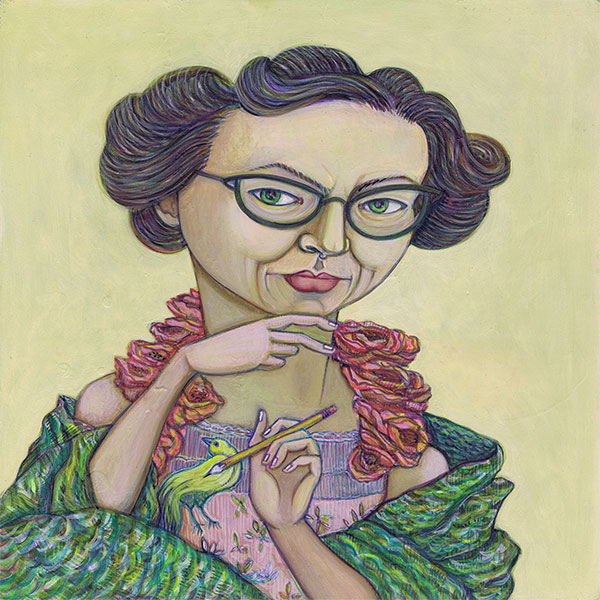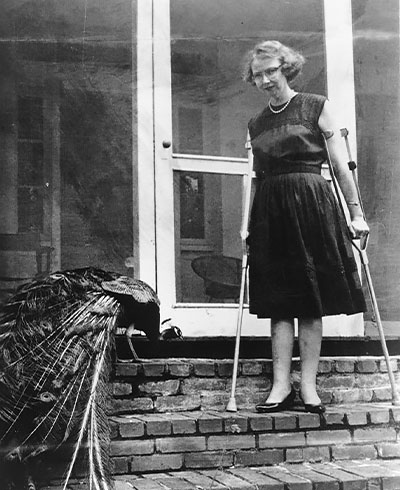Subtotal: $
Checkout-

Covering the Cover: Made Perfect
-

Calling from the Edge
-

The Disability Ratings Game
-

The Way Home
-

The Beginning of Understanding
-

Time for a Story
-

The Island of Misfit Toys
-

A More Christian Approach to Mental Health Challenges
-

Made Perfect
-

Mary’s Song
-

The Art of Disability Parenting
-

When Merit Drives Out Grace
-

Hide and Seek with Providence
-

Unfinished Revolution
-

Falling Down
-

The Hidden Costs of Prenatal Screening
-

The Baby We Kept
-

The World Turned Right-Side Up
-

The Lion’s Mouth
-

How Funerals Differ
-

One Star above All Stars
-

Stranger in a Strange Land
-

Spaces for Every Body
-

Poem: “Consider the Shiver”
-

Poem: “No Omen but Awe”
-

Poem: “So Trued to a Roar”
-

Forum: Letters from Readers
-

Editors’ Picks: “Dirty Work”
-

Editors’ Picks: “Millennial Nuns”
-

Editors’ Picks: “Directorate S”
-

Letter from Brazil
-

Peace for Korea

Flannery O’Connor
As a writer with a disability, the beloved Southern novelist showed the beauty of a costly life.
By Susannah Black Roberts
September 22, 2022
This article was first published in the Winter 2022 issue of Plough Quarterly, Made Perfect: Ability and Disability.
“Grace changes us and the change is painful,” wrote Flannery O’Connor to Cecil Dawkins in 1958. This is why “human nature vigorously resists grace.”
Flannery O’Connor knew about pain. Diagnosed with lupus at twenty-five, she spent most of the rest of her life living with her mother at Andalusia, the family farm near Milledgeville, Georgia. As the lupus and the side effects of its treatment progressively weakened her, she wrote. The steroids that treated her softened her bones; she had to use crutches to walk. Every day, she wrote, she attended Mass, she read and rested in the afternoon. Between her return to Georgia and her death, she completed two novels, more than two dozen short stories, and numerous essays, and kept up a lively correspondence close to home and much farther afield.

Katherine Sandoz, Flannery O’Connor in Gucci, 2016 Used by permission.
She died August 3, 1964, seven years after she had been told she wouldn’t live long. She was buried in Milledgeville, age thirty-nine.
Though she’d left Georgia at twenty to attend the Iowa Writers’ Workshop, and spent time writing at Yaddo in New York and at a friend’s home in Connecticut, she was always very much a Southern writer. “Anything that comes out of the South is going to be called grotesque by the northern reader,” she once said tartly, “unless it is grotesque, in which case it is going to be called realistic.”
Flannery O’Connor is one of the most evocative writers of the gospel in fiction who has ever lived. “The stories,” she wrote, “are hard but they are hard because there is nothing harder or less sentimental than Christian realism. … When I see these stories described as horror stories I am always amused because the reviewer always has hold of the wrong horror.”
Her stories return repeatedly to themes of pain, sickness, and physical disability; violence, social cruelty, and personal sin are their analogues. Such stories as “Everything That Rises Must Converge,” “Good Country People,” and “Greenleaf” show characters whose moral growth, when it comes, comes in and through pain: when, in the middle of weakness and suffering, the wretchedness of humanity is touched by grace: transfigured.
O’Connor’s preoccupation with both the morally grotesque and the physically disabled is related to her preoccupation with the fall of man. She suggested as much in an essay: “When you have to assume that [your audience is not Christian], then you have to make your vision apparent by shock – to the hard of hearing you shout, and for the almost-blind you draw large and startling figures.” Her audience assumed, in its midcentury optimism, that everything was OK. But everything is not OK. There is something wrong with humanity. There is something unnatural in nature. Lucynell is deaf and an innocent; Mr. Shiftlet has lost half an arm and is a heartless manipulator. Hulda’s artificial leg, even her smug philosophical atheism, are less a disability than the Bible salesman’s empty-souled hypocritical cruelty.
It’s not that the physical disability of her characters reflects moral grotesquerie; the physical is an analogue for the moral. The same wreck that wrecks the bodies wrecks the souls of men, and the society they’re living in. O’Connor herself is an example of this. Though she had a keen eye for the viciousness of racism in her society, she at times participated in it, as recent scholars have suggested.
O’Connor, I believe, would have had no trouble accepting that the not-OK-ness of humanity extended to herself as well. After all, this recognition lies at the heart of Christianity. In that letter to Cecil Dawkins, O’Connor reminded her that “the church is founded on Peter who denied Christ three times and couldn’t walk on water by himself.”

Flannery O'Connor, 1962 Photograph from the Library of Congress (public domain)
Peter’s faithless denial of Christ and his faltering as he walked to his Lord across the sea don’t end the story, because grace breaks in. There’s not always justice in O’Connor’s stories, or transformation, or redemption. But they hover around the edges of the text, shimmering behind it, glimpsed out of the corner of the eye.
These glimpses hint that, for O’Connor, disability may well be a metaphor or counterpoint to sin, but that it is not the end of the story. For her, even the grotesque – the sign of humanity’s not-OK-ness – also bears a positive meaning. As the critic Timothy Basselin has contended, the grotesque is, for O’Connor, beauty too. It gestures towards the beauty of our own limitedness, our dependence, the beauty of a costly life.
Famously, O’Connor took up raising peacocks after she returned to Milledgeville, eventually raising more than two hundred. The tail of the peacock is the classic example of what has been called the “handicap principle” in evolutionary biology. Proposed in 1975 by the Israeli biologists Amotz and Avishag Zahavi, this hypothesis seeks to explain such extravagant and seemingly useless evolutionary developments as the peacock’s tail. It’s costly for a male peacock to grow and then cart around such a tail. It takes a great deal of extra energy to grow it, and once it’s grown, it makes it harder for him to fly. But this costliness is, Zahavi hypothesized, a pledge of honesty. “I’m not just pretending to have resources of strength,” the peacock says. “If I didn’t have them I couldn’t afford this extravagant thing.” It signals that the one bearing the handicap is, to precisely the degree of the disadvantage, strong.
The riches that O’Connor had came from the treasurehouse of Christ and his church. They enabled her to bear her disability with grace, fruitfulness, and wit – and grotesque, extravagant beauty.
Already a subscriber? Sign in
Try 3 months of unlimited access. Start your FREE TRIAL today. Cancel anytime.











































Patrick
Thanks. Flannerys a favorite. Your insights are most helpful.